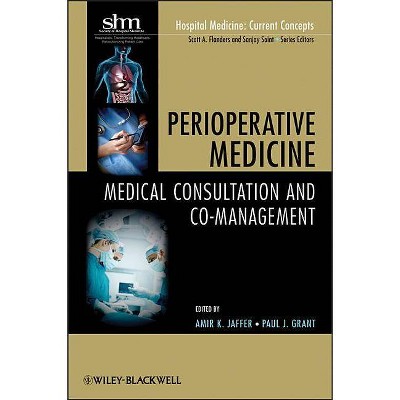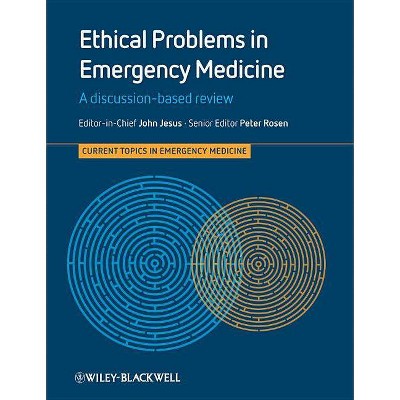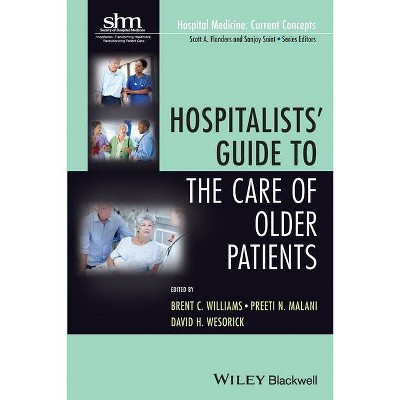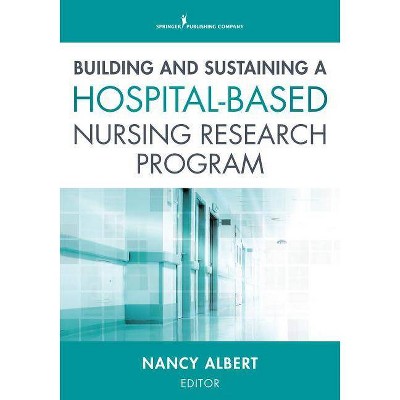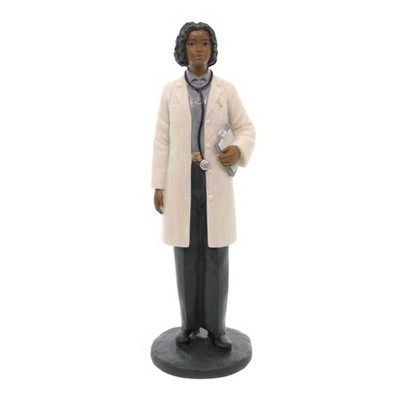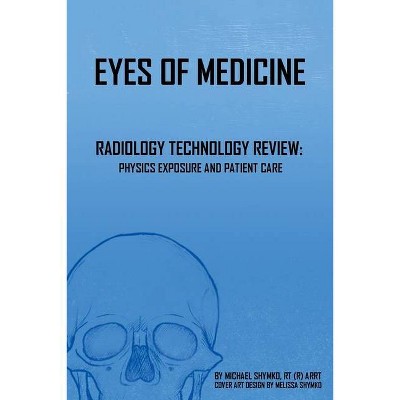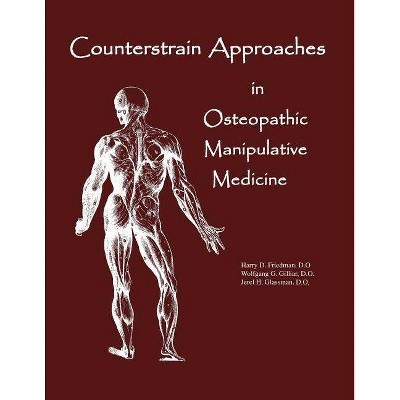Hospital-Based Palliative Medicine - (Hospital Medicine: Current Concepts) (Paperback)
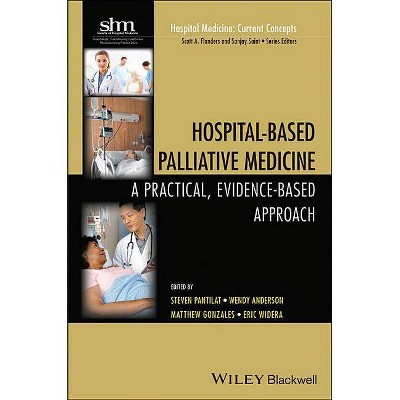
Similar Products
Products of same category from the store
AllProduct info
<p/><br></br><p><b> About the Book </b></p></br></br>"Hospital-Based Palliative Medicine: A Practical, Evidence-Based Approach focuses on improving a Hospitalist's ability to provide quality palliative care in the inpatient hospital setting. Although several large textbooks exist for the palliative care provider, there are few detailed resources aimed specifically at the general Hospitalist and hospital-based staff. Existing textbooks dedicate at most only one chapter to palliative care and they lack the detail and specificity in symptom management and communication skills to truly guide care. Hospital-Based Palliative Medicine addresses each of the major components involved in the delivery of inpatient palliative care. These include the management of complex symptoms and the use of specific communication techniques - right down to the actual words to say to the patient - to convey important information such as the reason for and use of medication and how to handle difficult topics with patients and their families and caregivers. The book's authors are all leaders in the field of palliative care, and most of them also practice as hospitalists, and thus understand both perspectives. Chapters are presented in a consistent format with particular attention to both clinical pearls and pitfalls, making the material practical and easily accessible to the busy hospitalist and associated hospital staff"--Provided by publisher.<p/><br></br><p><b> Book Synopsis </b></p></br></br><p>The first comprehensive, clinically focused guide to help hospitalists and other hospital-based clinicians provide quality palliative care in the inpatient setting.<br /><br />Written for practicing clinicians by a team of experts in the field of palliative care and hospital care, Hospital-Based Palliative Medicine: A Practical, Evidence-Based Approach offers: <br /><br /></p> <ul> <li>Comprehensive content over three domains of inpatient palliative care: symptom management, communication and decision making, and practical skills, </li> <li>Detailed information on assessment and management of symptoms commonly experienced by seriously ill patients, </li> <li>Advise on the use of specific communication techniques to address sensitive topics such as prognosis, goals of care, code status, advance care planning, and family meetings in a patient- and family-centered manner, </li> <li>Targeted content for specific scenarios, including palliative care emergencies, care at the end of life, and an overview of post-hospital palliative care options, </li> <li>Self-care strategies for resilience and clinician wellness which can be used to help maintain an empathic, engaged, workforce and high quality patient care, </li> <li>A consistent chapter format with highlighted clinical pearls and pitfalls, ensuring the material is easily accessible to the busy hospitalist and associated hospital staff.</li> </ul> <p>This title will be of use to all hospital clinicians who care for seriously ill patients and their families. Specialist-trained palliative care clinicians will also find this title useful by outlining a framework for the delivery of palliative care by the patient's front-line hospital providers. <br /><br />Also available in the in the Hospital-Based Medicine: Current Concepts series: <br /><br />Inpatient Anticoagulation<br />Margaret C. Fang, Editor, 2011<br /><br />Hospital Images: A Clinical Atlas <br />Paul B. Aronowitz, Editor, 2012<br /><br />Becoming a Consummate Clinician: What Every Student, House Officer, and Hospital Practitioner Needs to Know<br />Ary L. Goldberger and Zachary D. Goldberger, Editors, 2012<br /><br />Perioperative Medicine: Medical Consultation and Co-Management<br />Amir K. Jaffer and Paul J. Grant, Editors, 2012<br /><br />Clinical Care Conundrums: Challenging Diagnoses in Hospital Medicine <br />James C. Pile, Thomas E. Baudendistel, and Brian J. Harte, Editors, 2013<br /><br />Inpatient Cardiovascular Medicine<br />Brahmajee K. Nallamothu and Timir S. Baman, Editors 2013</p><p/><br></br><p><b> From the Back Cover </b></p></br></br><p>The first comprehensive, clinically focused guide to help hospitalists and other hospital-based clinicians provide quality palliative care in the inpatient setting.</p> <p>Written for practicing clinicians by a team of experts in the field of palliative care and hospital care, <i>Hospital-Based Palliative Medicine: A Practical, Evidence-Based Approach</i> offers: </p> <ul> <li>Comprehensive content over three domains of inpatient palliative care: symptom management, communication and decision making, and practical skills, </li> <li>Detailed information on assessment and management of symptoms commonly experienced by seriously ill patients, </li> <li>Advise on the use of specific communication techniques to address sensitive topics such as prognosis, goals of care, code status, advance care planning, and family meetings in a patient- and family-centered manner, </li> <li>Targeted content for specific scenarios, including palliative care emergencies, care at the end of life, and an overview of post-hospital palliative care options, </li> <li>Self-care strategies for resilience and clinician wellness which can be used to help maintain an empathic, engaged, workforce and high quality patient care, </li> <li>A consistent chapter format with highlighted clinical pearls and pitfalls, ensuring the material is easily accessible to the busy hospitalist and associated hospital staff.</li> </ul> <p>This title will be of use to all hospital clinicians who care for seriously ill patients and their families. Specialist-trained palliative care clinicians will also find this title useful by outlining a framework for the delivery of palliative care by the patient's front-line hospital providers. </p> <p>Also available in the in the <i>Hospital-Based Medicine: Current Concepts</i> series: </p> <p>Inpatient Anticoagulation<br /> Margaret C. Fang, Editor, 2011</p> <p>Hospital Images: A Clinical Atlas<br /> Paul B. Aronowitz, Editor, 2012</p> <p>Becoming a Consummate Clinician: What Every Student, House Officer, and Hospital Practitioner Needs to Know <br /> Ary L. Goldberger and Zachary D. Goldberger, Editors, 2012</p> <p>Perioperative Medicine: Medical Consultation and Co-Management<br /> Amir K. Jaffer and Paul J. Grant, Editors, 2012</p> <p>Clinical Care Conundrums: Challenging Diagnoses in Hospital Medicine <br /> James C. Pile, Thomas E. Baudendistel, and Brian J. Harte, Editors, 2013</p> <p>Inpatient Cardiovascular Medicine <br /> Brahmajee K. Nallamothu and Timir S. Baman, Editors 2013</p><p/><br></br><p><b> About the Author </b></p></br></br><p><b>Steven Z. Pantilat</b>, MD, is a Professor of Medicine in the Department of Medicine at the University of California, San Francisco, the Alan M. Kates and John M. Burnard Endowed Chair in Palliative Care, and the founding Director of the UCSF Palliative Care Program. Dr. Pantilat is also the Director of the UCSF Palliative Care Leadership Center that trains teams from hospitals across the country on how to establish Palliative Care Services. In 2007 he was a Fulbright Senior Scholar studying palliative care at the Royal Prince Alfred Hospital, University of Sydney, and Curtin University in Sydney, Australia. Dr. Pantilat is also a hospitalist, and is a nationally recognized expert in hospital medicine as well as in Palliative Medicine.</p>
Price History
Price Archive shows prices from various stores, lets you see history and find the cheapest. There is no actual sale on the website. For all support, inquiry and suggestion messagescommunication@pricearchive.us
